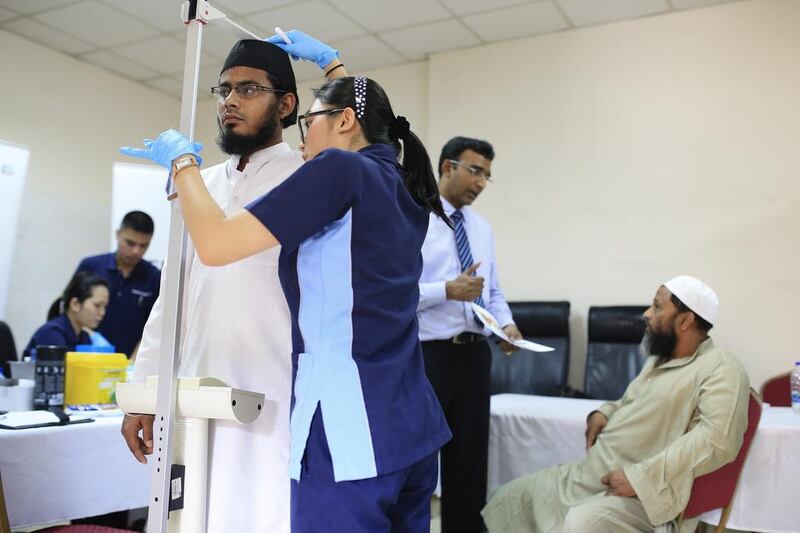DUBAI // Hundreds of labourers have been warned to watch out for danger signs such as breathlessness and fatigue, and seek medical advice before their health deteriorates.
More than 900 workers were told to control sugar intake, eat healthily and check blood-pressure levels at a health camp in Al Quoz, conducted by the Pakistan Association Dubai (Pad) to mark World Labour Day, which was Thursday.
“I have no tension. I’m a happy person and I work a lot so I don’t understand why my blood pressure is high,” said Mamtaz Wali, 43, who has worked as a machine operator in a Dubai factory for 16 years.
“But the doctors say I need to walk after I eat and not immediately sleep.
“So I must be careful about my weight, eat less fried food and check my pressure.”
Workers gathered under a canopy waiting for their turn to meet specialists, listen to presentations on diabetes and hyper-tension, and read leaflets on exercise and diet.
“We are far away from home and we work hard, so it’s important to stay healthy,” said Abdul Sattar, 73, a factory worker and driver who provides for his wife and five children in Pakistan’s Swat Valley.
“I keep telling young people that family totally rely on us and our health is everything.”
Doctors said those with high sugar and blood-pressure readings were asked to go for further check-ups.
The association also holds free monthly clinics at its offices on Oud Metha Road, helps chronic patients with medication and lowers laboratory test charges.
“It’s usually too expensive for wor-kers to meet a specialist, so screenings help because many get direct access to doctors,” said Dr Faisel Ikram, Pad’s general secretary and a surgical gastroenterologist with City Hospital.
“They are being told that for diabetes, they must watch out for excessive hunger and urination and infections that flare up and don’t subside quickly.
“They are made to understand that in case of tiredness and fatigue they must reach out to a doctor. The severe and chronic cases will be referred to a hospital.”
Diabetes and cardiovascular diseases are two major causes of concern, not just in the UAE but the entire Middle East and North Africa region.
There are 745,940 diabetics in the UAE – one in 10 of the population – according to the International Diabetes Federation.
Heart disease, the world’s leading cause of death, also accounts for one in four deaths in the country.
“We try and impress on them that high blood pressure is serious and must be taken care of because it can lead to a heart attack, stroke or kidney failure,” said Dr Aamerah Shah, a primary-care specialist from the American Hospital in Dubai.
“Workers also complain of muscle pain in the upper, lower back and knees, so we have given them basic exercises that can be done for joint, back and shoulder pain.”
Explaining how basic hygiene can prevent diseases is vital because labourers live and work in proximity, said Dr Harris Shah, a consultant dermatologist from NMC hospital.
“We talk to them about sexually transmitted diseases, safe sex and the repercussions on their family if they contract HIV or any other disease,” Dr Shah said.
“They can’t afford to see a dermatologist so it is helpful if they understand how to prevent simple fungal infections and stay clean.”
Workers also said they generally preferred to take medicine without referring to a doctor.
“We have to convince them to visit a doctor because most men prefer to take a painkiller and go to work so they will not miss a day,” said Mohammed Altaf, the labour camp administrator.
“We tell them you can manage pain for a day but you don’t know what disease you have so go get advice from a doctor.”
rtalwar@thenational.ae






